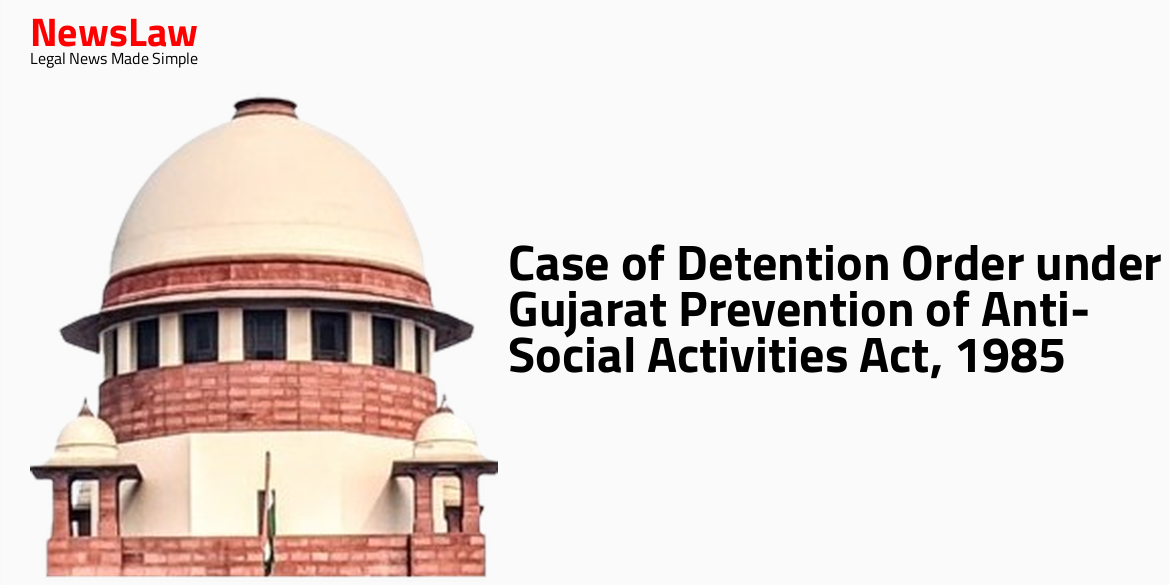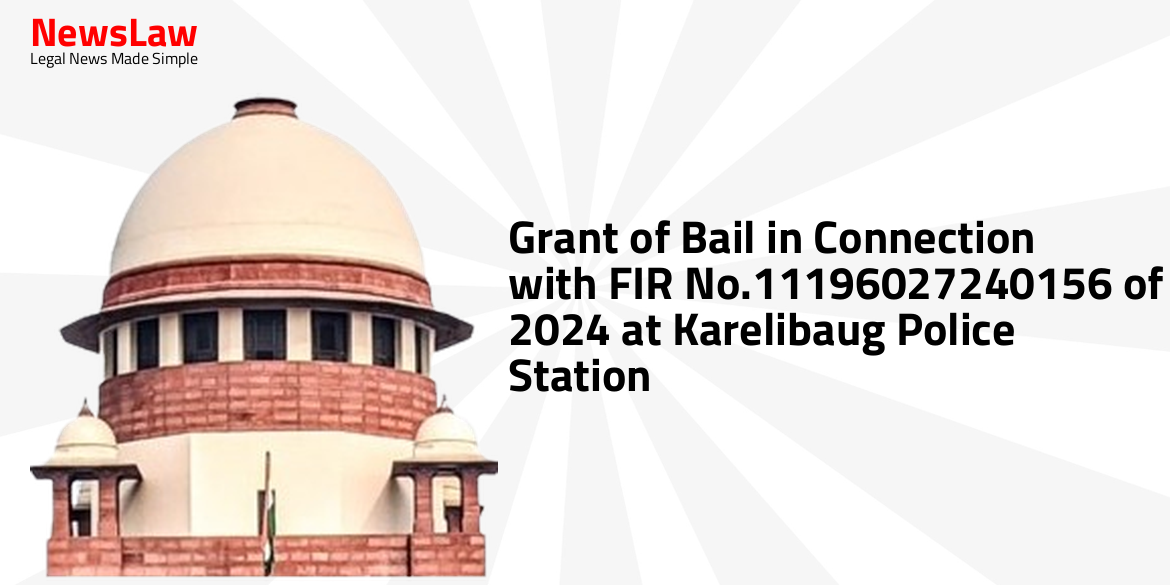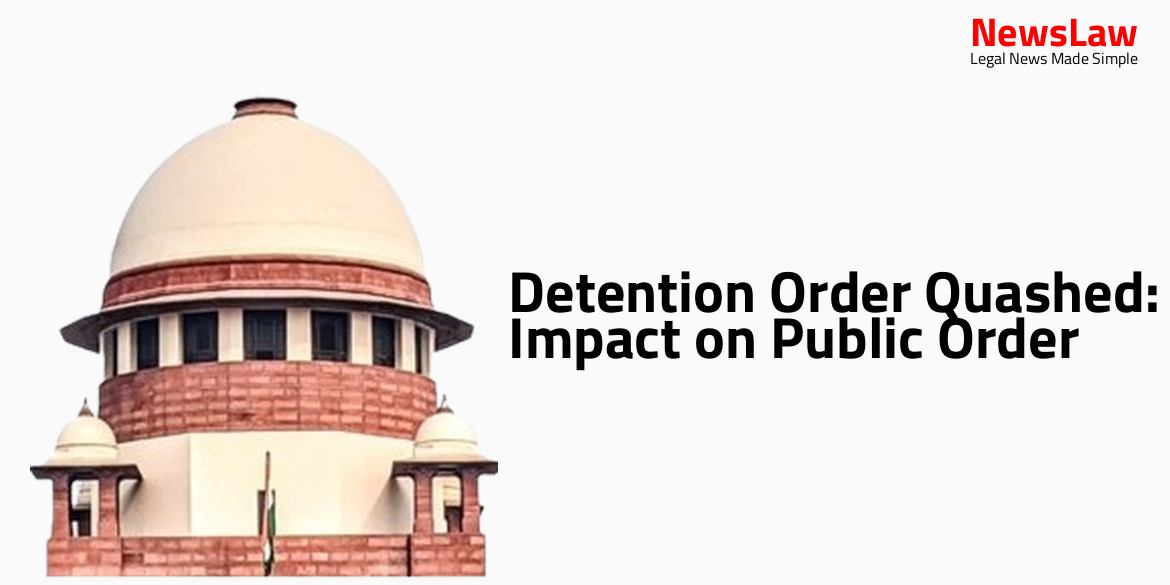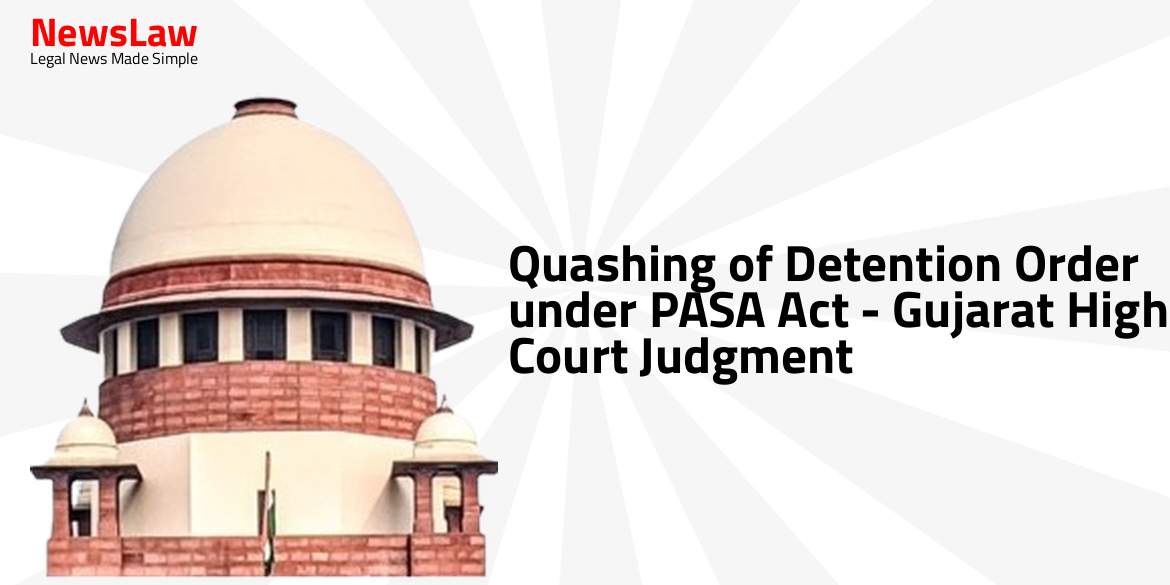In a significant ruling by the Gujarat High Court, a case concerning a detention order under the Gujarat Prevention of Anti-Social Activities Act, 1985 was addressed. This judgment holds relevance in the realm of preventive detention laws and the protection of personal liberties. Stay tuned to delve into the details of this crucial legal decision.
Facts
- The present petition challenges the detention order dated 09.01.2024 passed by the detaining authority under the Gujarat Prevention of Anti-Social Activities Act, 1985.
- The detaining authority detained the petitioner under Section 3(1) of the Act.
- The petitioner is defined as the detenue under Section 2(c) of the Act.
- The petitioner seeks relief against the said detention order.
Issue
- The issue involves a substantial question of law related to the interpretation of the Constitution of India.
- The case raises an important constitutional matter which needs to be clarified.
- The interpretation of specific orders made under the Constitution is crucial in this case.
Arguments
- The impugned order of detention is challenged as it is solely based on the registration of two FIRs under Section 379 of the Indian Penal Code.
- The activities alleged do not have a nexus with the maintenance of public order but can be categorized as a breach of law and order.
- Apart from witness statements and FIRs, no other relevant material shows that the detenue’s actions fall under the definition of breach of public order.
- The detenue’s activities are argued to not have disturbed the social fabric to the extent of posing a threat to the existence of normal life and rule of law.
- The detaining authority failed to consider that the detenue is out on bail for all offenses.
- Detention order passed by detaining authority found to be not legal, valid, and in accordance with the law.
- Offences alleged in the FIRs do not impact public order as required under the Act.
- Other relevant penal laws are sufficient to address the situation.
- Allegations against the detenue are not relevant for Section 2(c) of the Act.
- Learned APP for the respondent-State supports the detention order, stating sufficient evidence was found during the investigation.
- The detenue is said to be habitually engaging in activities defined under Section 2(c) of the Act.
- Detaining authority’s decision considered appropriate in the given case.
Analysis
- District Magistrate can take action under Rule 30(1)(b) to prevent subversion of public order but not in aid of maintenance of law and order under ordinary circumstances.
- Offences alleged against the Appellant attract punishment under the Andhra Pradesh Prohibition Act, hence should be dealt with under those laws.
- Preventive detention should not be used as a remedy in this case.
- The detention should not be prolonged without trial unless the person poses a serious threat to society.
- Preventive detention is meant to prevent specific types of offences, not replace ordinary criminal law enforcement.
- The detaining authority did not consider material circumstances affecting the subjective satisfaction required for detention.
- Preventive detention should not absolve investigating authorities of their duty to investigate crimes.
- There was no mention in the order of any application for cancellation of bail by the State authorities.
- The distinction between disturbance to ‘law and order’ and disturbance to ‘public order’ has been clearly settled by a Constitution Bench in the case of Dr. Ram Manohar Lohia vs. State of Bihar.
- Preventive detention involves detaining a person without trial to prevent them from committing certain offenses, but it cannot be a substitute for ordinary law enforcement.
- The personal liberty of an accused cannot be sacrificed on the altar of preventive detention without a valid justification.
- A mere disturbance of law and order leading to disorder is not necessarily sufficient for action under the Preventive Detention Act; it must be a disturbance that affects public order.
- Every breach of the peace does not lead to public disorder, and it is crucial to distinguish between serious disorder affecting the community and minor breaches of peace with local significance.
- The exceptional powers of preventive detention must be exercised with caution and a proper understanding of whether the individual’s actions are prejudicial to the interest and security of the State, or seek to disturb public order.
- Simplicitor registration of FIR/s alone does not have a nexus with the breach of public order.
- Authority cannot invoke power under Section 3(1) of the Act solely based on FIR/s.
- Personal liberty under Article 21 is of utmost importance and must be protected.
- Detaining authority must ensure that detention follows established legal procedures.
- Article 22 is an exception to Article 21 and applies in rare cases only.
Decision
- Petitioner-detainee to be set at liberty forthwith if not required in any other case.
- Rule made absolute to the extent mentioned.
- The present petition is allowed.
- Impugned order of detention dated 09.01.2024 is quashed and set aside.
- Direct service is permitted.
Case Title: HAMIRBHAI @LALO KARMANBHAI KUVARIYA DEVI PUJAK Vs. COMMISSIONER OF POLICE
Case Number: R/SCA/1954/2024



